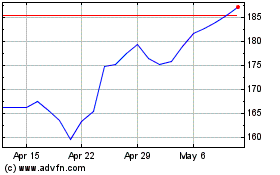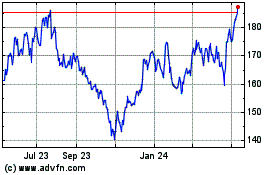Texas Instruments Inc.'s (TXN) second-quarter profit fell 13%
because of disruptions from the Japan earthquake and weakness at
Nokia Corp. (NOK), and the chip maker provided cautious guidance
for the third quarter amid worries about the broader economic
environment.
TI, which makes chips used in everything from cellphones to
industrial equipment, has seen a sharp rebound in demand after the
recession caused customers to virtually stop buying chips. But the
company's manufacturing operations were hurt by the earthquake and
tsunami in Japan, and its wireless business has seen some weakness
from major customer Nokia Corp. (NOK).
Softness at Nokia, which has been restructuring itself and last
week reported a loss in the second quarter, led TI last month to
lower its guidance for the second quarter. TI on Monday reported
second-quarter results largely in line with its lowered view but
issued cautious projections for the third quarter.
Chief Financial Officer Kevin March said the company is seeing
some "encouraging" trends, such as a bigger backlog and returning
demand from Japanese customers, but he said the computing and
consumer sectors, which includes TVs and game consoles, "have a
kind of lackluster growth outlook." He added that macroeconomic
uncertainty is factoring into results.
"The outlook tries to reflect those mixed signals," March said
in an interview. "At the same time we staged inventory so should
the quarter turn out to be a more normal seasonal quarter than
outlook suggests, we'll be able to respond quite nicely."
The company projected a third-quarter profit of 55 cents to 65
cents a share on revenue of $3.4 billion to $3.7 billion. Analysts
polled by Thomson Reuters expected 64 cents a share and $3.62
billion, respectively.
Shares, up 24% over the past 12 months through Monday's close,
rose a fraction to $31.50 in after-hours trading, after initially
declining.
"This is the first [semiconductor] company talking about macro
weakness," Brigantine Advisors analyst Ramesh Misra said. He added
that others, such as Intel Corp. (INTC), have alluded to weakness
but haven't highlighted it as much as TI.
"TI is a very big player, and they address a much broader space
than just computing," he added.
TI has been working to resolve issues related to damage at a
couple of its factories during the March earthquake, tsunami and
nuclear disaster in Japan. The company said Monday that it resumed
production at its Japan factories ahead of schedule.
TI had estimated a 10-cent hit to earnings in the second quarter
from earthquake-related costs and lost revenue, March said, but
results ended up being lowered by about 8 cents.
March said third-quarter results will reflect some continued
lost production, "although to a lesser extent." He added
third-quarter projections assume a penny impact from
earthquake-related costs.
TI has been benefiting in recent quarters from increased focus
on its highly profitable analog and embedded-application chips, as
well as its applications processor for smartphones, tablets and
other devices. It reached a $6.5 billion deal in April to buy rival
National Semiconductor Corp. (NSM), seeking to expand its reach in
the analog market.
TI said Monday that the deal is on track to close by the end of
the year.
"The underlying core business at TI is doing extremely well,"
March said in an interview. "We believe both analog and embedded
gained market share this quarter."
TI reported a profit of $672 million, or 56 cents a share, down
from $769 million, or 62 cents a share, a year earlier. Per-share
earnings were slightly better than TI's projections for 51 cents to
55 cents.
Revenue slipped 1.1%, to $3.46 billion, slightly above the
midpoint of TI's lowered guidance of $3.36 billion to $3.5
billion.
The company last month lowered its guidance for the second
quarter, citing weakness at Nokia. Nokia has struggled to keep up
in a smartphone market increasingly dominated by rivals such as
Google Inc. (GOOG) and Apple Inc. (AAPL).
TI has been winding down its business selling mobile wireless
chips--of which Nokia is the only known customer--after major
cellphone makers shifted to a multisupplier strategy. Revenue for
the chips slid 32% quarter over quarter.
Gross margin narrowed to 50.7% from 54.2% on the revenue
decline.
Sales of analog chips grew 5%, though earnings decreased 5.5%.
The embedded processing business posted 16% higher sales, driving
operating profit up 23%.
Total orders fell about 3% from a year earlier and were about
even with the first quarter.
Ron Slaymaker, vice president and head of investor relations,
said industrial demand is "steady," while smartphones continue to
do well. In addition, communications infrastructure is strong.
Automotive was strong overall for the quarter but saw some
weakness in June, March said in an interview. At least part of the
softness likely was due to supply chain issues related to the Japan
earthquake, he said.
-By Shara Tibken, Dow Jones Newswires; 212-416-2189;
shara.tibken@dowjones.com
Texas Instruments (NASDAQ:TXN)
Historical Stock Chart
From Jun 2024 to Jul 2024

Texas Instruments (NASDAQ:TXN)
Historical Stock Chart
From Jul 2023 to Jul 2024
